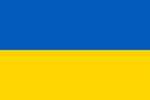Time Person of the Year facts for kids
Quick facts for kids Person of the Year |
|
|---|---|
| Presented by | Time |
| Country | United States |
| First awarded | 1927 |
Person of the Year (called Man of the Year or Woman of the Year until 1999) is an annual issue of the American news magazine and website Time featuring a person, group, idea, or object that "for better or for worse ... has done the most to influence the events of the year". The editors select the featured subject in a "secretive ... process." The Time website or a partner organization also runs an annual online reader's poll that has no effect on the selection, although no poll was held in 2023 or 2024.
Background
The tradition of selecting a "Man of the Year" began privately in 1927, with Time editors contemplating the news makers of the year after a series of "slow news days" leading up to New Year's Day. The idea originally focused on a Man of the Week before it was decided to use Lindbergh to represent the predominant story of 1927, with the magazine listing him as Man of the Year being published in early 1928.
The idea was also an attempt to remedy the editorial embarrassment earlier that year of not having aviator Charles Lindbergh on its cover following his historic transatlantic flight. By the end of the year, it was decided that a cover story featuring Lindbergh as the Man of the Year would serve both purposes.
Before the online poll was instituted, "readers were invited to weigh in by mail."
Selection
National leaders
Since the list began, every serving president of the United States has been a Man or Person of the Year at least once, with the exceptions of Calvin Coolidge (in office at the time of the first issue), Herbert Hoover (the subsequent president), and Gerald Ford (the only president never to have been elected to the office of president or vice president). Most were named Man or Person of the Year either the year they were elected or while they were in office; the only one to be given the title before being elected was Dwight D. Eisenhower, in 1944, as Supreme Commander of the Allied Invasion Force, eight years before his first election. He received the title again in 1959 while in office. Franklin D. Roosevelt became the first chosen US president and is the only person to have received the title three times, first as president-elect (1932) and later as the incumbent president (1934 and 1941).
All countries' heads of state or government to have been chosen as Man, Woman, or Person of the Year (arranged in chronological order by country name, from the most frequently selected) are:
Winston Churchill was chosen a second time for the special "Man of the Half-Century" edition in 1949 while serving as Leader of the Opposition before his second premiership; Charles de Gaulle was chosen while being elected President of France before formally taking office; Lech Wałęsa and Nelson Mandela were chosen before being elected President of Poland and President of South Africa, respectively.
Women
Before 1999, four women were granted the title as individuals: three as "Woman of the Year"—Wallis Simpson (1936), Queen Elizabeth II (1952), and Corazon Aquino (1986)—and one as half of "Man and Wife of the Year", Soong Mei-ling (jointly with Chiang Kai-shek) in 1937. "American Women" were recognized as a group in 1975. Other classes of people recognized comprise both men and women, such as "Hungarian Freedom Fighters" (1956), "U.S. Scientists" (1960), "The Inheritors" (1966), "The Middle Americans" (1969), "The American Soldier" (1950 and 2003), "You" (2006), "The Protester" (2011), and "Ebola Fighters" (2014). However, the title on the magazine remained "Man of the Year" for both the 1956 "Hungarian Freedom Fighter" and the 1966 "Twenty-five and Under" editions which both featured a woman standing behind a man, and "Men of the Year" on the 1960 "U.S. Scientists" edition which exclusively featured men on its cover. It was not until the 1969 edition on "The Middle Americans" that the title embraced "Man and Woman of the Year".
In 1999, the title was changed to the gender-neutral "Person of the Year" (its first recipient under the new name being Jeff Bezos of Amazon.com). Women who have been selected for recognition after the renaming include "The Whistleblowers" (Cynthia Cooper, Coleen Rowley, and Sherron Watkins) in 2002; Melinda Gates (jointly with Bill Gates and Bono) in 2005; Angela Merkel (2015); "The Silence Breakers" (2017); Greta Thunberg (2019); Kamala Harris (jointly with Joe Biden) in 2020; and Taylor Swift (2023). To celebrate International Women's Day in 2020, Time editors released 89 new magazine covers, each showing women, in addition to the 11 already chosen, as counterparts to the Man of the Year choices from the past century.
Since 2022, Time has awarded a separate "Women of the Year" title to a number of women each year, in a similar fashion to Time 100.
Groups and non-humans
Despite the name, the title is not just granted to individuals. Pairs of people such as married couples and political opponents, classes of people, and inanimate objects have all been selected for the special year-end issue.
Multiple named people
- Chiang Kai-shek and Soong Mei-ling, president and first lady of China (1937)
- William Anders, Frank Borman, and Jim Lovell, crew of Apollo 8 (1968)
- Richard Nixon and Henry Kissinger, political allies (1972)
- Ronald Reagan and Yuri Andropov, Cold War rivals (1983)
- Nelson Mandela and F. W. de Klerk; Yasser Arafat and Yitzhak Rabin, political leaders leading peace negotiations (1993)
- Bill Clinton and Ken Starr, key figures in the Clinton impeachment (1998)
- Cynthia Cooper, Coleen Rowley, and Sherron Watkins, whistleblowers (2002)
- Bill Gates, Melinda Gates, and Bono, philanthropists (2005)
- Joe Biden and Kamala Harris, American president-elect and vice president-elect (2020)
Classes of unnamed people
- The American fighting-man / The American soldier (1950 and 2003)
- The Hungarian freedom fighter (1956)
- U.S. scientists (1960)
- The Inheritor (1966)
- Middle Americans (1969)
- American women (1975)
- You (2006)
- The Protester (2011)
- Ebola fighters (2014)
- The Silence Breakers (2017)
- The Guardians (2018)
Inanimate objects
- The Computer (Machine of the Year, 1982)
- The Endangered Earth (Planet of the Year, 1988)
Abstract concepts
- The Spirit of Ukraine (2022)
Special editions
In 1949, Winston Churchill was named Man of the Half-Century, and the last issue of 1989 named Mikhail Gorbachev as "Man of the Decade". The December 31, 1999 issue of Time named Albert Einstein the "Person of the Century". Both Franklin D. Roosevelt and Mahatma Gandhi were chosen as runners-up. Aside from Einstein, the December 31 edition also named Persons of the Century for every century of the 2nd millennium: William the Conqueror for the 11th century, Saladin for the 12th century, Genghis Khan for the 13th century, Giotto for the 14th century, Johannes Gutenberg for the 15th century, Elizabeth I for the 16th century, Isaac Newton for the 17th century, Thomas Jefferson for the 18th century, and Thomas Edison for the 19th century.
Persons of the Year
|
Contents
|
| Year | Image | Choice | Lifetime | Notes | Runners-up |
|---|---|---|---|---|---|
| 1927 | 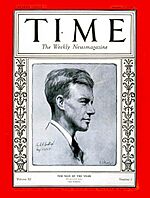 |
Charles Lindbergh | 1902–1974 | Lindbergh completed the first solo transatlantic flight in May 1927 by piloting his monoplane Spirit of St. Louis from Garden City, New York to Paris, France. | |
| 1928 | 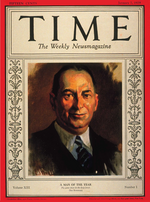 |
Walter Chrysler | 1875–1940 | In 1928, Chrysler oversaw a merger of his company, Chrysler, with Dodge before beginning work on the Chrysler Building. | |
| 1929 |  |
Owen D. Young | 1874–1962 | Young chaired a committee which authored 1929's Young Plan, a program for settlement of German reparations after World War I. | |
| 1930 | 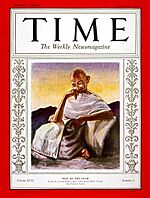 |
Mahatma Gandhi | 1869–1948 | Gandhi was the leader of India's independence movement. In 1930, he led the Salt Satyagraha, a 240-mile march to protest the imposition of taxes on salt by the British Raj. | |
| 1931 | 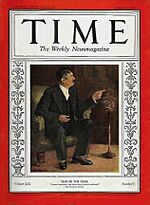 |
Pierre Laval | 1883–1945 | Laval was first appointed Prime Minister of France in 1931. He was popular in the American press at the time for opposing the Hoover Moratorium, a temporary freeze on World War I debt payments that was disliked in both France and the US. | |
| 1932 |  |
Franklin D. Roosevelt | 1882–1945 | Roosevelt won the 1932 US presidential election by a landslide, defeating the incumbent, Herbert Hoover. | |
| 1933 |  |
Hugh S. Johnson | 1882–1942 | In 1933, Johnson was appointed director of the National Recovery Administration. US President Franklin D. Roosevelt gave him the task of bringing industry, labor and government together to create codes of "fair practices" and set prices. | |
| 1934 |  |
Franklin D. Roosevelt (2) | 1882–1945 | Roosevelt was President of the United States from 1933 to 1945. In 1934, Roosevelt's New Deal reforms were beginning to bring results. | |
| 1935 | 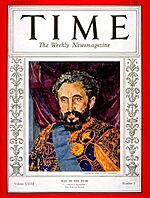 |
Haile Selassie | 1892–1975 | Selassie was Emperor of Ethiopia in 1935, when Italian forces invaded Ethiopia, starting the Second Italo-Abyssinian War. | |
| 1936 |  |
Wallis Simpson | 1896–1986 | In 1936, Simpson's relationship with King Edward VIII of the United Kingdom led the king to abdicate the throne to marry her. | |
| 1937 | 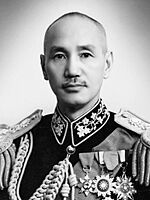 |
Chiang Kai-shek | 1887–1975 | Chiang was Premier of the Republic of China at the outbreak of the Second Sino-Japanese War in 1937. | |
 |
Soong Mei-ling | 1898–2003 | Soong was wife of Chiang Kai-shek from 1927 until his death in 1975, and was active in rallying support for the Republic of China in the US. Addressed as Madame Chiang Kai-Shek by the magazine, she was recognized together with her husband as "Man & Wife of the Year". | ||
| 1938 | 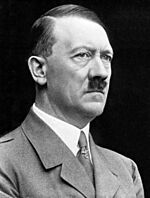 |
Adolf Hitler | 1889–1945 | As Chancellor of Germany, Hitler oversaw the unification of Germany with Austria and the Sudetenland in 1938, after the Anschluss and Munich Agreement respectively. Instead of a conventional portrait, the cover was an illustration by Rudolph von Ripper entitled 'From the unholy organist, a hymn of hate'. | |
| 1939 | 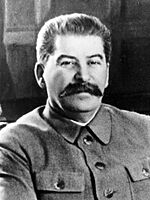 |
Joseph Stalin | 1878–1953 | In 1939, Stalin was General Secretary of the Communist Party of the Soviet Union and Premier of the Soviet Union. He oversaw the signing of a non-aggression pact with Nazi Germany before invading eastern Poland. | |
| 1940 |  |
Winston Churchill | 1874–1965 | Churchill was Prime Minister of the United Kingdom during the Dunkirk evacuation and the Battle of Britain. | |
| 1941 |  |
Franklin D. Roosevelt (3) | 1882–1945 | Roosevelt was President of the United States in 1941 during the attack on Pearl Harbor, declaration of war against Japan and resulting entry of the United States into World War II. The editors had already chosen Dumbo as their "Mammal of the Year" before the Pearl Harbor attack, but quickly changed it to Roosevelt. | |
| 1942 |  |
Joseph Stalin (2) | 1878–1953 | By 1942, Stalin was General Secretary of the Communist Party of the Soviet Union and Premier of the Soviet Union, overseeing the Battle of Stalingrad (1942–1943). | |
| 1943 |  |
George C. Marshall | 1880–1959 | As United States Army Chief of Staff in 1943, General Marshall was instrumental in organizing US actions in World War II. | |
| 1944 |  |
Dwight D. Eisenhower | 1890–1969 | General Eisenhower was Supreme Allied Commander in Europe during 1944's Operation Overlord. | |
| 1945 | 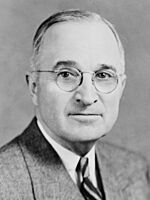 |
Harry S. Truman | 1884–1972 | Truman became President of the United States after the death of Franklin D. Roosevelt in 1945, authorizing the atomic bombings of Hiroshima and Nagasaki. | |
| 1946 | 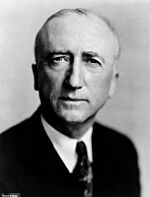 |
James F. Byrnes | 1882–1972 | In 1946, Byrnes was United States Secretary of State during the Iran crisis of 1946, taking an increasingly hardline position in opposition to Stalin. His speech, "Restatement of Policy on Germany", set the tone of future US policy, repudiating the Morgenthau Plan economic policies and giving Germans hope for the future. | |
| 1947 |  |
George C. Marshall (2) | 1880–1959 | Appointed United States Secretary of State in 1947, Marshall was the architect of the Marshall Plan. | |
| 1948 | 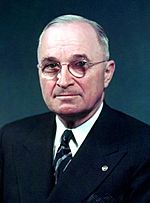 |
Harry S. Truman (2) | 1884–1972 | Truman was elected in his own right as President of the United States in 1948, which is considered to be one of the greatest election upsets in American history. | |
| 1949 |  |
Winston Churchill (2) | 1874–1965 | Proclaimed as the "Man of the half-century", Churchill had led Britain and the Allies to victory in WWII. In 1949, Churchill was Leader of the Opposition. | |
| 1950 | 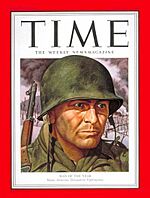 |
The American fighting-man | Representing US troops involved in the Korean War (1950–1953) | ||
| 1951 | 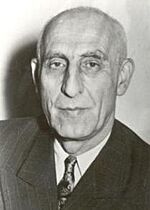 |
Mohammad Mossadegh | 1882–1967 | In 1951, Mossadegh was appointed Prime Minister of Iran and expelled western oil companies, starting the Abadan Crisis. | |
| 1952 | 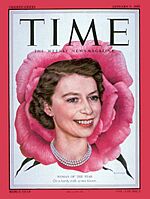 |
Elizabeth II | 1926–2022 | In 1952, Elizabeth acceded to the throne of the United Kingdom and the other Commonwealth realms upon the death of her father, King George VI. | |
| 1953 | 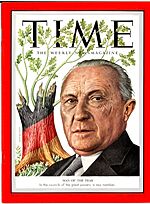 |
Konrad Adenauer | 1876–1967 | In 1953, Adenauer was re-elected as Chancellor of West Germany. Adenauer was overseeing the reconstruction of Germany and the Economic Miracle, had successfully restored relations with Germany's wartime enemies in the West, and was working towards European integration. | |
| 1954 | 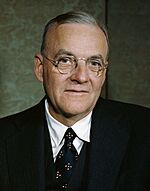 |
John Foster Dulles | 1888–1959 | As United States Secretary of State in 1954, Dulles was architect of the Southeast Asia Treaty Organization. | |
| 1955 |  |
Harlow Curtice | 1893–1962 | Curtice was President of General Motors (GM) from 1953 to 1958. In 1955, GM sold five million vehicles and became the first corporation to earn US$1 billion in a single year. | |
| 1956 |  |
The Hungarian freedom fighter | Representing Hungarian revolutionaries involved in the 1956 uprising against the Soviet-dominated government, which was put down by the Soviet Army | ||
| 1957 | 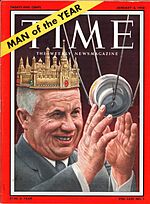 |
Nikita Khrushchev | 1894–1971 | In 1957, Khrushchev consolidated his leadership of the Soviet Union, surviving a plot to dismiss him by Stalinist members within the Presidium, and leading the Soviet Union into the Space Race with the launch of Sputnik 1. | |
| 1958 | 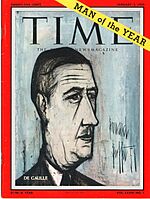 |
Charles de Gaulle | 1890–1970 | De Gaulle was appointed Prime Minister of France in May 1958 and, following the collapse of the Fourth Republic and establishment of the Fifth Republic, was then elected as President of France in December. | |
| 1959 | 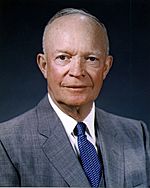 |
Dwight D. Eisenhower (2) | 1890–1969 | Eisenhower was President of the United States from 1953 to 1961. In 1959, Eisenhower arranged the state visit by Nikita Khrushchev to the United States and toured several countries, becoming the first US president to visit India. | |
| 1960 |  |
U.S. Scientists | Time claimed in 1960 "science is at the apogee of its power for good or evil", although it noted that "the 15 men [on the cover] include two or three whose greatest work is probably behind them".
The cover and piece spotlights the following scientists:
George Beadle, pioneer of genetics
Charles Draper, inventor of spacecraft inertial guidance systems John Enders, pioneer of polio and measles vaccines Donald A. Glaser, inventor of the bubble chamber Joshua Lederberg, discoverer of bacterial conjugation Willard Libby, contributor to radiocarbon dating Linus Pauling, pioneer of quantum chemistry and molecular biology Edward Purcell, co-discoverer of nuclear magnetic resonance Isidor Rabi, co-discoverer of nuclear magnetic resonance Emilio Segrè, discoverer of astatine, technetium and the antiproton William Shockley, co-inventor of the transistor Edward Teller, nuclear physicist and co-inventor of the hydrogen bomb Charles Townes, inventor of the maser James Van Allen, discoverer of the Van Allen radiation belt Robert Woodward, pioneer of organic synthesis |
||
| 1961 | 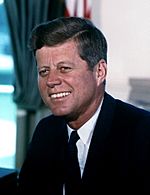 |
John F. Kennedy | 1917–1963 | Kennedy was inaugurated as President of the United States in 1961, ordering the failed invasion of Cuba by U.S.-trained Cuban exiles. | |
| 1962 |  |
John XXIII | 1881–1963 | Pope of the Roman Catholic Church from 1958 to 1963. In 1962, he volunteered as a mediator in the Cuban Missile Crisis between the U.S. and USSR, gaining praise from both sides. He also initiated the Second Vatican Council that same year. | |
| 1963 | 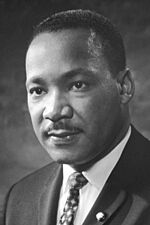 |
Martin Luther King Jr. | 1929–1968 | A leader of the American Civil rights movement, King delivered his famous "I Have a Dream" speech in 1963. | |
| 1964 | 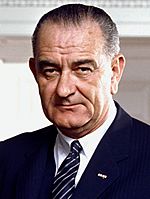 |
Lyndon B. Johnson | 1908–1973 | Johnson was elected in his own right as President of the United States in 1964, before securing the passage of the Civil Rights Act, declaring a War on poverty, and escalating US involvement in the Vietnam War. | |
| 1965 | 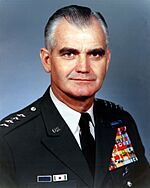 |
William Westmoreland | 1914–2005 | General Westmoreland was commander of US forces in South Vietnam during the Vietnam War. | |
| 1966 | 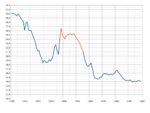 |
The Inheritor | Representing a generation of American men and women, aged 25 and under – the Baby Boom generation, who in 1966 made up nearly half the population and were influential both in the counterculture of the 1960s and as drafted soldiers in the Vietnam War. The face most prominently seen on the cover representing the generation was that of Thomas M. McLaughlin. | ||
| 1967 |  |
Lyndon B. Johnson (2) | 1908–1973 | Johnson was President of the United States from 1963 to 1969. Time noted that it had been a year of setbacks and failures for Johnson, with race riots across the US, deepening involvement in the Vietnam War, and the Dump Johnson movement within his own party. | |
| 1968 | 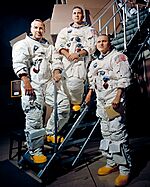 |
The Apollo 8 astronauts | Frank Borman: 1928–2023 Jim Lovell: Born 1928 William Anders: 1933–2024 |
In 1968, the American crew of Apollo 8 (William Anders, Frank Borman and Jim Lovell) became the first humans to travel beyond low Earth orbit, orbiting the Moon and paving the way for the first human Moon landings in 1969. | |
| 1969 |  |
The Middle Americans | Conservative, small-town Americans, also referred to as the silent majority. Time saw Middle America as the driving force behind Richard Nixon's 1968 election win, the background of the American astronauts of Apollo 11, and the conservative side of debates on social issues such as school desegregation, prayer in public schools, among others. | ||
| 1970 | 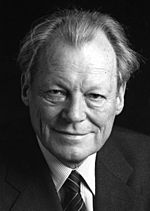 |
Willy Brandt | 1913–1992 | As Chancellor of West Germany, Brandt was acknowledged for "seeking to bring about a fresh relationship between East and West" through his "bold approach to the Soviet Union and the East Bloc". In 1970, Brandt renounced German claims on Poland and recognized East Germany, and acknowledged the Holocaust in Nazi-occupied Poland with the symbolic Kniefall von Warschau. | |
| 1971 | 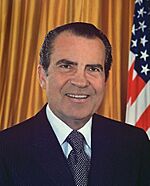 |
Richard Nixon | 1913–1994 | Nixon was President of the United States from 1969 to 1974. In 1971, Nixon had withdrawn the US dollar from the gold standard, triggering the Nixon shock, created the Economic Stabilization Program, and re-opened relations with communist China. | |
| 1972 | 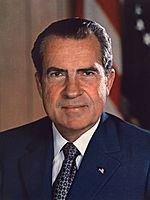 |
Richard Nixon (2) | 1913–1994 | As President of the United States, Nixon visited China in 1972, the first U.S. president to do so. Nixon later secured the SALT I pact with the Soviet Union before being re-elected in one of the largest landslide election victories in American history. | |
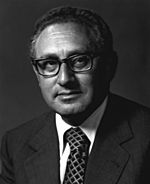 |
Henry Kissinger | 1923–2023 | Kissinger, as Nixon's National Security Advisor, traveled with the President to China in 1972, and was negotiating peace in the Vietnam War. | ||
| 1973 |  |
John Sirica | 1904–1992 | In 1973, as Chief Judge of the United States District Court for the District of Columbia, Sirica ordered President Nixon to turn over Watergate-related recordings of White House conversations. | |
| 1974 | 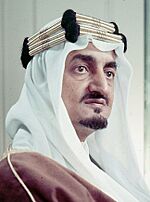 |
Faisal | 1906–1975 | Faisal, King of Saudi Arabia, was acknowledged in the wake of the oil crisis of 1973–1974, caused by Saudi Arabia withdrawing its oil from world markets in protest at Western support for Israel during the Yom Kippur War. | |
| 1975 |  |
American women | Highlighting the successes of the American feminist movement and "the status of the everyday, usually anonymous woman, who moved into the mainstream of jobs, ideas and policy making".
The cover and piece spotlights the following women:
Susan Brownmiller, author of Against Our Will
Kathleen Byerly, first female captain in the U.S. Navy Alison Cheek, first ordained Episcopalian minister Jill Conway, first female president of Smith College Betty Ford, politically active as First Lady of the United States Ella Grasso, first female Governor of Connecticut Carla Hills, first female United States Secretary of Housing and Urban Development Barbara Jordan, member of the United States House of Representatives Billie Jean King, tennis player and winner of the "Battle of the Sexes" Carol Sutton, first female editor of a major U.S. paper Susie Sharp, Chief Justice of the North Carolina Supreme Court Addie Wyatt, vice president of the Amalgamated Meat Cutters trade union |
||
| 1976 | 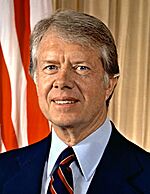 |
Jimmy Carter | Born 1924 | In 1976, Carter was elected President of the United States, defeating incumbent President Gerald Ford. | |
| 1977 | 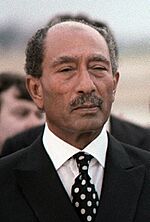 |
Anwar Sadat | 1918–1981 | Sadat, as President of Egypt, traveled to Israel in 1977—the first Arab leader to do so—to discuss normalization of Egypt–Israel relations. | |
| 1978 |  |
Deng Xiaoping | 1904–1997 | Deng, as Vice Premier, overthrew Hua Guofeng to assume de facto control over China in 1978, as Paramount leader. |
4
|
| 1979 | 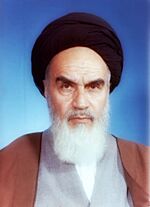 |
Ruhollah Khomeini | 1902–1989 | Khomeini led the 1979 Iranian Revolution, establishing himself as Supreme Leader. |
4
|
| 1980 |  |
Ronald Reagan | 1911–2004 | Reagan was elected President of the United States in 1980, defeating incumbent President Jimmy Carter. | |
| 1981 |  |
Lech Wałęsa | Born 1943 | Leader of the Polish Solidarity trade union and architect of the Gdańsk Agreement until his arrest by the communist authorities and the imposition of martial law in Poland in December 1981 |
4
|
| 1982 | 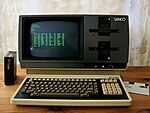 |
The Computer | Denoted "Machine of the Year" to herald the dawn of the Information Age
The feature spotlights the following people, in order:
Steve Jobs, founder of Apple Computer
John Opel, president and CEO of IBM Adam Osborne, founder of Osborne Computer Corporation Dan Bricklin, co-creator of VisiCalc Jack Tramiel, founder of Commodore International Clive Sinclair, founder of Sinclair Research |
||
| 1983 |  |
Ronald Reagan (2) | 1911–2004 | In 1983, as President of the United States, Reagan ordered the invasion of Grenada and championed the Strategic Defense Initiative. |
4
|
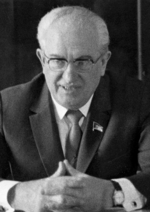 |
Yuri Andropov | 1914–1984 | Andropov, as General Secretary of the Communist Party of the Soviet Union, was a critic of the Strategic Defense Initiative and tried to revive stagnating Soviet economy. Andropov was hospitalized in August 1983 and died in 1984. | ||
| 1984 | 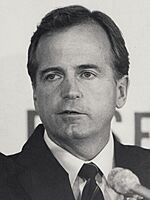 |
Peter Ueberroth | Born 1937 | Ueberroth orchestrated the organization of the 1984 Summer Olympics, which involved a Soviet-led boycott. |
4
|
| 1985 |  |
Deng Xiaoping (2) | 1904–1997 | As Paramount Leader of China, Deng acknowledged the need for "sweeping economic reforms that have challenged Marxist orthodoxies". In 1985, Deng had lifted price controls and eased the restrictions on private ownership and business. |
4
|
| 1986 | 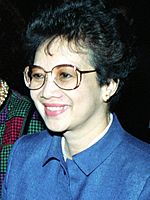 |
Corazon Aquino | 1933–2009 | Aquino was a prominent figure in 1986's People Power Revolution, being elected president of the Philippines. | |
| 1987 |  |
Mikhail Gorbachev | 1931–2022 | As general secretary of the Communist Party of the Soviet Union and leader of the Soviet Union, Gorbachev oversaw perestroika and glasnost political reforms in 1987, aimed at liberalizing Soviet society. | |
| 1988 | 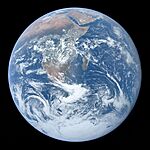 |
The Endangered Earth | Planet of the Year, representing the growing environmental movement as well as several natural and ecological disasters that struck in 1988: among them were the 1988–1989 North American drought, "syringe tide", 1988 Bangladesh cyclone and 1988 Armenian earthquake, as well as ozone depletion, global warming, radioactive contamination and deforestation. | ||
| 1989 |  |
Mikhail Gorbachev (2) | 1931–2022 | Acknowledged as "Man of the Decade". Gorbachev, as General Secretary of the Communist Party of the Soviet Union (Soviet leader), oversaw 1989's first free Soviet elections in history before the fragmentation of the Eastern Bloc and overthrow of Soviet-dominated communist governments in Eastern Europe. | |
| 1990 | 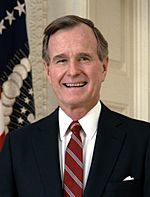 |
George H. W. Bush | 1924–2018 | As President of the United States, Bush oversaw U.S. involvement in the Gulf War (1990–1991). | |
| 1991 |  |
Ted Turner | Born 1938 | Founder of CNN. The piece particularly highlighted CNN's coverage of Operation Desert Storm and the Gulf War, proclaiming it "History as it happens". | |
| 1992 | 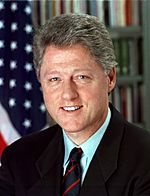 |
Bill Clinton | Born 1946 | Clinton was elected President of the United States in 1992, defeating incumbent President George H. W. Bush. | |
| 1993 |  |
The Peacemakers | Represented by Yasser Arafat, F. W. de Klerk, Nelson Mandela, and Yitzhak Rabin. De Klerk, as State President of South Africa, oversaw Mandela's release from prison in 1990. In 1993, the pair were negotiating the end of the Apartheid system, and had just jointly won the Nobel Peace Prize. Arafat, as President of the Palestinian National Authority, and Rabin, as Prime Minister of Israel, signed the 1993 Oslo Accord, the first face-to-face agreement between Palestinian and Israeli authorities. | ||
| 1994 |  |
John Paul II | 1920–2005 | Pope of the Roman Catholic Church from 1978 to 2005. In 1994, he had been active in several social debates: he released a book-length interview and the English translation of the Catechism of the Catholic Church, ruled out the ordination of women, and established relations with Israel. | |
| 1995 |  |
Newt Gingrich | Born 1943 | Leader of the "Republican Revolution", a Republican Party election landslide, which led to Gingrich being elected Speaker of the House | |
| 1996 | 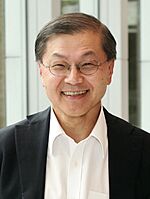 |
David Ho | Born 1952 | Ho, a scientist, pioneered much AIDS research. In 1996, he had announced that a medical trial of combination therapy had reduced the viral load in HIV-positive patients to levels too low to be measured, changing the disease profile from terminal to a manageable disease. | |
| 1997 | 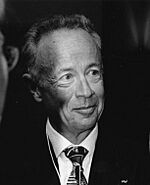 |
Andrew Grove | 1936–2016 | In 1997, Grove was chairman and CEO of Intel, recognized as a pioneer in the semiconductor industry and taken as a representative of the Digital Revolution and the tech boom. | |
| 1998 |  |
Bill Clinton (2) | Born 1946 | As President of the United States, Clinton was impeached in 1998 following the Lewinsky scandal. The Senate acquitted him of the charges. | |
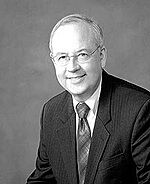 |
Ken Starr | 1946–2022 | Starr, a lawyer investigating various figures within the Clinton administration, published his Starr Report in 1998, opening the door for the impeachment of Bill Clinton. | ||
| 1999 |  |
Jeff Bezos | Born 1964 | Bezos is the founder and was the CEO of Amazon.com, at that point one of the most successful companies in the dot-com boom. | |
| 2000 | 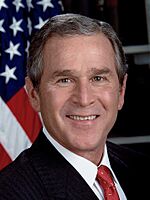 |
George W. Bush | Born 1946 | In 2000, Bush was elected President of the United States, defeating incumbent Vice President Al Gore. |
4
|
| 2001 |  |
Rudy Giuliani | Born 1944 | Giuliani, Mayor of New York City at the time of the September 11 attacks in 2001, was selected as a symbol of America's response to the attacks. | |
| 2002 | The Whistleblowers | Represented by Cynthia Cooper, Coleen Rowley, and Sherron Watkins. In 2001, Watkins uncovered accounting irregularities in the financial reports of Enron, testifying before Congressional committees the following year. In 2002, Cooper exposed a $3.8 billion fraud at WorldCom. At the time, this was the largest incident of accounting fraud in U.S. history. In 2002, Rowley, an FBI agent, gave testimony about the FBI's mishandling of information related to the September 11 attacks of 2001. | |||
| 2003 | 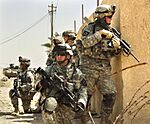 |
The American soldier (2) | Representing U.S. forces around the world, especially in the Iraq War (2003–2011) | ||
| 2004 | 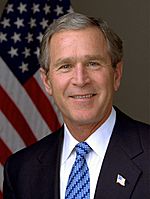 |
George W. Bush (2) | Born 1946 | In 2004, Bush was re-elected President of the United States, defeating John Kerry and overseeing US involvement in the Iraq War. | |
| 2005 |   |
The Good Samaritans | Represented by Bono, Bill Gates, and Melinda Gates. Bono, philanthropist and member of the rock band U2, helped to organize the 2005 Live 8 concerts. Bill Gates, founder of Microsoft and richest person in the world at the time, and his wife Melinda, founded the philanthropic Bill & Melinda Gates Foundation. | ||
| 2006 |  |
You | Representing individual content creators on the World Wide Web | ||
| 2007 | 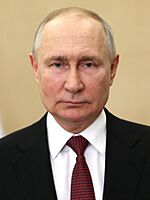 |
Vladimir Putin | Born 1952 | Putin was President of Russia from 2000 to 2008, and from 2012 onwards. In 2007, it was apparent that Putin's power would continue after his presidential term expired: he had suppressed much of the opposition to his rule, and had secured his position as Prime Minister of Russia to his loyalist successor Dmitry Medvedev. | |
| 2008 | 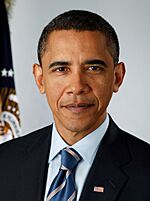 |
Barack Obama | Born 1961 | In 2008, Obama was elected President of the United States, defeating John McCain to become the first African-American President of the United States in January 2009. | |
| 2009 | 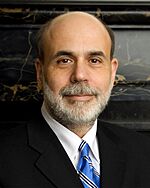 |
Ben Bernanke | Born 1953 | Chairman of the Federal Reserve during the financial crisis of 2007–08 and the following Great Recession |
4
|
| 2010 |  |
Mark Zuckerberg | Born 1984 | Founder of the social-networking website Facebook. In 2010, Facebook passed half a billion users but was involved in privacy disputes, and Zuckerberg had been the subject of the Oscar-winning biographical film The Social Network. | |
| 2011 | 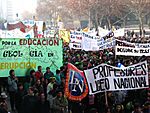 |
The Protester | Recognizing the historic significance of many grassroots protests across the world during that year, such as the ongoing Arab Spring and those against austerity measures in Greece and later in Spain, against corruption in India, against the drug war in Mexico, for education in Chile, for social justice in Israel, as well as the riots in England, the anti-government protests in Russia and the emerging global Occupy movement |
4
|
|
| 2012 | 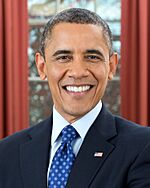 |
Barack Obama (2) | Born 1961 | In 2012, Obama was re-elected President of the United States, defeating Mitt Romney. | |
| 2013 |  |
Francis | Born 1936 | Elected Pope of the Roman Catholic Church in 2013, following the resignation of Pope Benedict XVI | |
| 2014 | 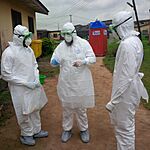 |
Ebola fighters | "Ebola fighters" refers to health care workers who helped stop the spread of the Ebola virus during the Ebola virus epidemic in West Africa, including not only doctors and nurses, but also ambulance attendants, burial parties and others.
Those represented on the covers included
Jerry Brown, the medical director at the Eternal Love Winning Africa Hospital in Monrovia, Liberia,
Kent Brantly, a physician with Samaritan's Purse and the first American to be infected in the 2014 outbreak, Ella Watson-Stryker, a health promoter for Doctors Without Borders who is originally from the United States, Foday Gallah, an ambulance supervisor and Ebola survivor from Monrovia, Liberia, Salome Karwah, a trainee nurse and counselor from Liberia whose parents died of Ebola, Pardis Sabeti from the Broad Institute. |
||
| 2015 | 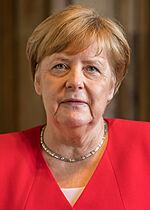 |
Angela Merkel | Born 1954 | Chancellor of Germany from 2005 to 2021, recognized for leadership in the Greek debt crisis and European migrant crisis |
6
|
| 2016 |  |
Donald Trump | Born 1946 | In 2016, Trump was elected President of the United States, defeating Hillary Clinton. |
5
|
| 2017 | The Silence Breakers | The people who spoke out against harassment.
The feature also specifically spotlights, in order:
actress Alyssa Milano
activist Tarana Burke actress Selma Blair the seven plaintiffs in a lawsuit against the Plaza Hotel politician Sara Gelser entrepreneur Lindsay Meyer dishwasher Sandra Pezqueda actress Rose McGowan psychotherapist and writer Wendy Walsh blogger Lindsey Reynolds housekeeper Juana Melara journalist Sandra Muller actor Terry Crews University of Rochester professors Celeste Kidd and Jessica Cantlon journalist Megyn Kelly journalist Jane Merrick producer Zelda Perkins European Parliament member Terry Reintke charity worker Bex Bailey art curator Amanda Schmitt filmmaker Blaise Godbe Lipman anonymous former office assistant. |
|||
| 2018 |    |
The Guardians |
Journalists who faced persecution, arrest or murder for their reporting. Those highlighted on four different covers were:
The feature also spotlights the following journalists, in order:
Shahidul Alam of Bangladesh
Nguyễn Ngọc Như Quỳnh of Vietnam Dulcina Parra of Mexico Luz Mely Reyes of Venezuela Can Dündar of Turkey Tatyana Felgenhauer of Russia Amal Habani of Sudan Arkady Babchenko of Russia. |
||
| 2019 |  |
Greta Thunberg | Born 2003 | Swedish environmental activist and founder of the School Strike for Climate campaign. In 2019, Thunberg led the Global Week for Future with over four million protestors and addressed the 2019 UN Climate Action Summit with her "How Dare You" speech. | |
| 2020 | 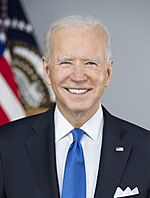 |
Joe Biden | Born 1942 | In 2020, Biden and Harris were elected President and Vice President of the United States respectively, defeating incumbent President Donald Trump and Vice President Mike Pence. In January 2021, Harris became the first woman, first African American, and first Asian American vice president. |
3
|
 |
Kamala Harris | Born 1964 | |||
| 2021 |  |
Elon Musk | Born 1971 | CEO of Tesla, Inc., founder and CEO of SpaceX. In 2021, Musk had become the richest person in the world and first person reported to have a net worth of over 300 billion US dollars. Recognized for the achievements of stated companies in the prior years, including the first all-civilian orbital flight, as well as his public image. | Time did not release a shortlist for 2021. |
| 2022 |  |
Volodymyr Zelenskyy | Born 1978 | President of Ukraine since 2019, and supreme commander-in-chief during the 2022 Russian invasion of Ukraine |
9
Liz Cheney
Ron DeSantis Gun safety advocates Elon Musk Protesters in Iran MacKenzie Scott Supreme Court of the United States Xi Jinping Janet Yellen |
| The Spirit of Ukraine | "The Spirit of Ukraine" represents the "resilience of the Ukrainian people and the Ukrainian resistance, as well as foreign aid to Ukraine".
The feature spotlights the following people and organizations, in order:
Surgeon David Nott and the David Nott Foundation
Chef José Andrés and the World Central Kitchen Restaurant owner Ievgen Klopotenko Opera singer Sergiy Ivanchuk Anesthetist Iryna Kondratova Actor Liev Schreiber and BlueCheck Ukraine Entrepreneur Oleg Rogynskyy Entrepreneur Elon Musk, engineer Oleg Kutkov and Starlink Medic Yuliia Paievska Journalist Olga Rudenko and the Kyiv Independent |
||||
| 2023 |  |
Taylor Swift | Born 1989 | Singer-songwriter whose 2023–2024 Eras Tour became the highest-grossing concert tour of all time. The tour had a significant cultural and economic impact in 2023. Time described Swift as the first Person of the Year to be recognized for their "achievement in the arts". Swift was also on the 2017 Person of the Year cover, called "The Silence Breakers". She was noted by the magazine as the first woman to appear twice on a Person of the Year cover. |
8
Sam Altman
Barbie Charles III Hollywood strikers Jerome Powell Vladimir Putin Trump Prosecutors Xi Jinping |
| 2024 |  |
Donald Trump (2) | Born 1946 | In 2024, Trump was re-elected President of the United States, defeating incumbent Vice President Kamala Harris and becoming the second president to win two nonconsecutive terms after Grover Cleveland. |
Other categories
Every year, in addition to the main Person of the Year, Time (sometimes alongside a partner company) acknowledges impactful people or groups in other categories. This is a relatively recent practice, beginning in 1998 when Mark McGwire was awarded the title of Hero of the Year and becoming a regular event in 2018 with the re-introduction of the Heroes of the Year award.
Heroes of the Year was joined by Athlete of the Year, CEO of the Year, Entertainer of the Year and Guardians of the Year in 2019, Kid of the Year in 2020, Breakthrough of the Year, Dreamer of the Year, Icon of the Year and Innovator of the Year in 2022, Team of the Year in 2023 and Community of the Year in 2024.
In line with the introduction of these new categories, Time has expanded their annual Person of the Year private event to include and celebrate the recipients of the other categories and other Time awards. In 2022, a "Person of the Year Reception" was held at Plaza Hotel, which featured video messages from Person of the Year Volodymyr Zelenskyy and Dreamer of the Year Donnel Baird, an interview with Icon of the Year Michelle Yeoh and a performance from Breakthrough of the Year Mickey Guyton. This was followed up by 2023's "A Year in TIME" event, which featured an interview with CEO of the Year Sam Altman, a performance from Breakthrough of the Year Alex Newell and speeches from Padma Lakshmi (a Time100 Impact Award winner) and Claire Vlases (a Time Earth Award winner).
Athlete of the Year
Athlete of the Year was awarded in partnership with Oura Health in 2021 and LG in 2022.
| Year | Choice | Notes |
|---|---|---|
| 2019 | United States women's national soccer team | The international women's soccer team for the United States, who won the 2019 FIFA Women's World Cup |
| 2020 | LeBron James | American basketball player, won the 2020 NBA Finals with his Los Angeles Lakers |
| 2021 | Simone Biles | American gymnast, pulled out of multiple gymnastics events during the Tokyo Olympics for mental health concerns |
| 2022 | Aaron Judge | American baseball outfielder, hit the most home runs in a season in the history of the American League with 62 |
| 2023 | Lionel Messi | Argentine footballer, won the 2022 FIFA World Cup with Argentina national team, record eighth Ballon d'Or and transferred to Inter Miami CF |
| 2024 | Caitlin Clark | American women's basketball player, was the All-WNBA, 2024 WNBA Rookie of the Year with the Indiana Fever. |
Breakthrough of the Year
In 2022, this selection was called Breakthrough Artist of the Year
| Year | Choice | Notes |
|---|---|---|
| 2022 | Mickey Guyton | American country music artist |
| 2023 | Alex Newell | American actor |
CEO of the Year
In 2019 and 2020, this selection was called Businessperson of the Year.
| Year | Choice | Notes |
|---|---|---|
| 2019 | Bob Iger | CEO and executive chairman of The Walt Disney Company |
| 2020 | Eric Yuan | CEO and founder of Zoom Video Communications |
| 2023 | Sam Altman | CEO and co-founder of OpenAI |
| 2024 | Lisa Su | CEO, president and chair of AMD |
Community of the Year
Community of the Year is awarded in partnership with Land O'Lakes.
| Year | Choice | Notes |
|---|---|---|
| 2024 | People of Agriculture | Representing the global rural farming community |
Dreamer of the Year
Dreamer of the Year is awarded in partnership with American Family Insurance.
| Year | Choice | Notes |
|---|---|---|
| 2022 | Donnel Baird | American entrepreneur and CEO of BlocPower |
| 2023 | Syd Kitson | Chairman and CEO of Kitson and Partners and former professional American football guard |
| 2024 | Portland Fire & Rescue | The fire and rescue department of Portland, which helped combat the 2024 Oregon wildfires. |
| American Family Insurance Claims and Sales Teams, Omaha | American Family Insurance's claims support team, which provided crucial support in the aftermath of a tornado outbreak in April 2024 in Blair, Nebraska. | |
| Rebuilding Together, Tampa Bay | American non-profit organization that provided relief in the Tampa Bay area following the destruction of hurricanes Helene and Milton. |
Icon of the Year
| Year | Choice | Notes |
|---|---|---|
| 2022 | Michelle Yeoh | Malaysian actress |
| 2024 | Elton John | British singer-songwriter |
Kid of the Year
| Year | Choice | Notes |
|---|---|---|
| 2020 | Gitanjali Rao | Scientist and inventor |
| 2021 | Orion Jean | Humanitarian |
| 2024 | Heman Bekele | Scientist and inventor |
Team of the Year
Team of the Year is awarded in partnership with Smartsheet.
| Year | Choice | Notes | Runners-up |
|---|---|---|---|
| 2023 | HP's Social Impact team | The team consists of Michele Malejki, Mariama Kabia, Anshu Grover, Ina Progonati, Stephanie Bormann and Julio Vera Barajas. |
2
Pfizer's RSV vaccine leadership team
Syngenta's Research & Development Team |
Entertainer of the Year
In 2022, Entertainer of the Year was awarded in partnership with Montblanc.
| Year | Choice | Notes |
|---|---|---|
| 2019 | Lizzo | American rapper and singer-songwriter |
| 2020 | BTS | South Korean K-pop boy band |
| 2021 | Olivia Rodrigo | American singer-songwriter |
| 2022 | Blackpink | South Korean K-pop girl group |
Hero(es) of the Year
In 2020, Heroes of the Year was awarded in partnership with State Farm.
| Year | Choice | Notes |
|---|---|---|
| 1998 | Mark McGwire | Baseball player for the St. Louis Cardinals, who hit 70 home runs in 1998, breaking the single-season home run record. In 2010, McGwire admitted he used steroids during the 1998 season. |
| 2018 | The Thai Cave Rescuers | The Tham Luang cave rescue took place during June and July 2018, where a group of 12 boys and their junior soccer team's assistant coach Ekkapol Chantawong, who had been trapped in a cave for over two weeks, were successfully located and rescued through an operation involving over 10,000 people. Time's corresponding article highlights the heroic actions of Chantawong, Narongsak Osottanakorn (the governor of Chiang Rai province at the time and overseer of the rescue operation), John Volanthen and Rick Stanton (two divers who first found the group alive), Samarn Kunan (the rescue's only immediate casualty) and Richard Harris (the anesthesiologist and cave diver who played a crucial role in the rescue). |
| James Shaw Jr. | Shaw disarmed a gunman during the Nashville Waffle House shooting on April 22, 2018, preventing the death toll from going above 4, and started a GoFundMe campaign the following day which went on to raise over $240,000 for the families of the victims. | |
| Brad Brown | Brown, a hospital chaplain at Feather River Hospital in Paradise, California, assisted with the evacuation of the hospital during Camp Fire and personally drove three immobile patients out of town, successfully getting them to a hospital in Chico after hours of potentially fatal road delays. | |
| Tammie Jo Shults | Shults was the pilot of Southwest Airlines Flight 1380 on April 17, 2018, who, along with her first officer Darren Lee Ellisor, saved the lives of 143 following the failure of an engine which had fragments break off that damaged other parts of the plane and killed 1 passenger. | |
| Mamoudou Gassama | On May 26, 2018, Gassama scaled four floors of an apartment building in Paris in under a minute, saving the life of a four-year-old boy dangling from a balcony and drawing comparisons to Spider-Man. | |
| 2019 | ||
| Defenders of Notre Dame | Time's corresponding article discusses the actions of those who saved Notre-Dame's sacred treasures during the fire on April 15, 2019 (particularly Antoine-Marie Préaut, a conservator of Paris's historic monuments, and Laurent Prades, Notre-Dame's operational director), the ~400 firefighters who combatted the fire, and those who had begun preparing for the cathedral's reconstruction. | |
| Ryan Kyote | Kyote, a nine-year-old resident of Napa, California, used his allowance to pay off his grade's $74 lunch debt. His mother posted about it on social media and the story went viral, starting a wider national movement against school lunch debt. As a result, Kyote's school district reversed their lunch debt policy and a law was passed in California banning "lunch shaming" (a term for giving worse food to students with debt). | |
| Satchel Smith | Smith, a 21-year-old student in Beaumont, Texas, was the sole employee trapped in a hotel alongside 90 guests for over 30 hours during Tropical Storm Imelda. He stayed awake during the whole ordeal, and was assisted by guests in making dinner and providing stranded truckers with food and water. | |
| Nicole Chamberlain | On November 11, 2019, Chamberlain, a bus driver in Waukesha, Wisconsin, saw a two-year-old girl and her six-year-old brother alone in temperatures below 20 °F (−7 °C) near a busy intersection. She brought them on board her bus, warmed them up and stayed with them until their grandmother showed up alongside police officers. | |
| Keanon Lowe | On May 19, 2019, Lowe, a teacher at Parkrose High School in Portland, Oregon, saw a student armed with a shotgun and successfully disarmed him. Immediately after, he gave the student a sympathetic hug and provided him with comforting words. | |
| Chella Phillips | Phillips, who runs a dog refuge in Nassau, Bahamas, managed to protect the refuge's 82 dogs, alongside 15 other dogs, from Hurricane Dorian in her own home. During the week following the hurricane, she sent 68 of those dogs to homes and rescue groups in the United States after her story went viral there. | |
| 2020 | Australia's Volunteer Firefighters | Time's corresponding article highlights the work done by volunteer firefighters during the 2019–20 Australian bushfire season, including three that died on the job. |
| Jason Chua and Hung Zhen Long | Chua and Hung, co-owners of the Beng Who Cooks food stall in Singapore, committed to delivering free food to those who could not afford it during COVID-19 lockdowns from April to June 2020. In total, they spent $11,000 on ~2,500 free meals. | |
| Greg Dailey | Following the rise of the COVID-19 pandemic in March 2020, Dailey, a newspaper deliveryman in Mercer County, New Jersey, began a new service of dropping off goods free of charge. During the rest of the year, he, with the help of his family, supplied over 140 homes and conducted over 1000 grocery runs in his local area. | |
| Rahul Dubey | On June 1, 2020, during the George Floyd protests in Washington, D.C., Dubey provided refuge in his home to ~70 protestors who were being barricaded and pepper-sprayed by police, even letting them stay overnight to avoid curfew breaches. | |
| Pastor Reshorna Fitzpatrick and Bishop Derrick Fitzpatrick | In April 2020, Reshorna and Derrick Fitzpatrick, a married couple who run Stone Temple Missionary Baptist Church in Chicago, began providing ~300 food boxes per week to people who became unemployed following the outbreak of the COVID-19 pandemic. They expanded their operation throughout the year, obtaining a supply of fresh produce from a local Black- and women-led nonprofit farm, providing hot soup every week and giving out supplies such as face masks and hand sanitizer. | |
| 2021 | Vaccine scientists | The feature is dedicated to those that contributed to the creation of COVID-19 vaccines, and in particular spotlights Katalin Karikó, Barney S. Graham, Kizzmekia Corbett and Drew Weissman, pioneers of mRNA vaccine technology. |
| 2022 | Women of Iran | After the death of Mahsa Amini on September 16, 2022, who was arrested for allegedly wearing her hijab improperly and later died after she had been —according to eyewitnesses— severely beaten by religious morality police officers, massive global protests began. Initial protests, mostly led by women, demanded an end to the mandatory hijab law, which has been in place since the 1979 Islamic revolution. According to Iran Human Rights, at least 481 protesters were killed in these protests as of January 9, 2023. |
Innovator of the Year
| Year | Choice | Notes |
|---|---|---|
| 2022 | Gregory Robinson and the James Webb Space Telescope team | Robinson was the telescope's program director from 2018 to 2022. |
Guardians of the Year
In 2020, Guardians of the Year was awarded in partnership with Amazon.
| Year | Choice | Notes |
|---|---|---|
| 2019 | American public servants | The feature spotlights those involved in that year's impeachment inquiry against Donald Trump, particularly Marie Yovanovitch, William Taylor, Fiona Hill, Alexander Vindman, Mark Sandy, Jennifer Williams, David Holmes, Laura Cooper and the original whistleblower. |
| 2020 | Anthony Fauci and frontline health workers | Recognising the actions of frontline health workers around the world that helped contain and reduce the effects of the COVID-19 pandemic. Fauci was the director of the National Institute of Allergy and Infectious Diseases at the time, and is credited with being a pivotal figure in the United States' fight against the pandemic. |
| Porche-Bennett-Bey, Assa Traoré and racial justice organizers | Recognising the actions of those who organized racial justice movements such as the George Floyd protests. |
Online poll
From 2010 to 2022, Time held an annual online poll for the readers to vote for who they believed to be the Person of the Year. While many mistakenly believed the winner of the poll to be the Person of the Year, the title, as mentioned above, is decided by the editors of Time.
| Year | Readers' Choice | Notes |
|---|---|---|
| 2010 | Julian Assange | Founder of WikiLeaks |
| 2011 | Recep Tayyip Erdoğan | Prime Minister of Turkey |
| 2012 | Kim Jong-un | Supreme Leader of North Korea |
| 2013 | Abdel Fattah el-Sisi | President of Egypt |
| 2014 | Narendra Modi | Prime Minister of India |
| 2015 | Bernie Sanders | United States Senator from Vermont and 2016 presidential candidate |
| 2016 | Narendra Modi | Prime Minister of India |
| 2017 | Mohammad bin Salman | Crown Prince of Saudi Arabia |
| 2018 | BTS | K-pop band |
| 2019 | Hong Kong Protesters | Protesters in Hong Kong in response to the extradition bill |
| 2020 | Essential Workers | Those who worked during the COVID-19 pandemic |
| 2021 | Jair Bolsonaro | President of Brazil |
| 2022 | Women Protesters in Iran | Women protesters in Iran who took part in the Mahsa Amini protests |
See also
 In Spanish: Persona del año para niños
In Spanish: Persona del año para niños
- Time 100
- Time 100: The Most Important People of the Century
- Time100 Impact Awards
- Canadian Newsmaker of the Year (Time), printed in the Canadian issue of Time until 2008
- Breakthrough of the Year
- Forbes list of the World's Most Powerful People


